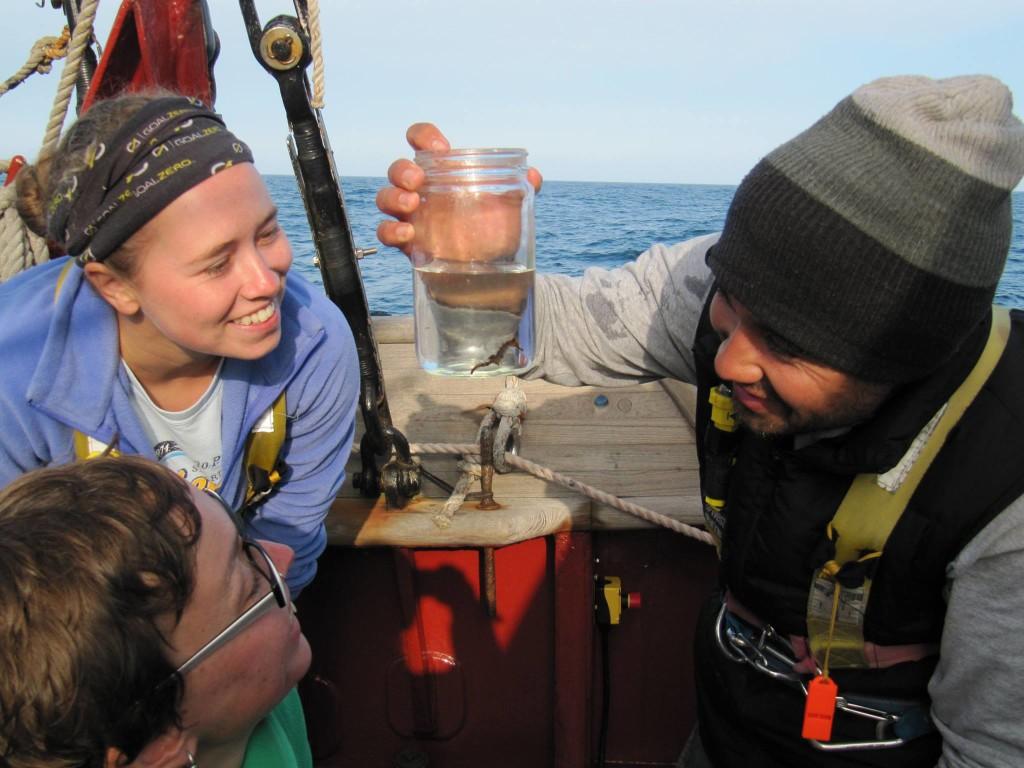LILY Bohlke
bohlkeli@grinnell.edu
Students studying abroad usually choose to do so on land, but a few adventurous Grinnellians have taken the path less traveled: spending a semester on the open ocean with SEA Semester.
Caroline Graham ’16 explained that with the SEA Semester program, students spend four to six weeks in Woods Hole, Mass., going to class and working on research projects. These tasks are completed in preparation of spending six weeks on a sailboat navigating, cooking, being on watch or performing scientific research.
For example, Nick Matesanz ’16 circumnavigated New Zealand on a Global Oceans Program in the fall of 2014. Matesanz researched phytoplankton diversity and community assemblages, which had samples for research at the ready at any time.
“For the phytoplankton, we would throw a bucket over the side and pull the bucket out and filter it,” Matesanz said.
Students who chose to participate in SEA semester were primarily interested in engaging with and studying marine biology, both in the ocean and at the Woods Hole Marine Biological Laboratory, according to Jenny Dong ’17.
In the spring 2015 semester, Graham participated in the Marine Biodiversity and Conservation Program, a joint science and policy program. She researched microbial communities on micro-plastics in the Sargasso Sea, a region of the large gyre in the North Atlantic Ocean.
Last fall, Dong went on an Oceans and Climate Program that focused on the effects that climate change has on the ocean, and the effects that the ocean has on climate change. She sailed across the Atlantic Ocean from Canary Islands to Dominica to St. Croix, during which she used samples of zooplankton to research ocean acidification.
“It was marked as the same trip as Columbus’s second trip,” Dong noted. “I wanted something that would help me determine whether or not I wanted to go into research. I got to do everything from looking up articles to collecting data from the ocean.”

Photo contributed.
Matesanz also said he wanted to do something different for his study abroad experience.
“You get to live on a research vessel that still uses sail power,” Matesanz said. “It just seemed like the coolest opportunity.”
In addition to biological research, SEA Semester participants learn the ins and outs of sailing and navigation. According to Matesanz, the learning process was much quicker than he expected.
“You are the crew, so you need to know what everything is, what every single line is called,” he said. “They drill you on it.”
Dong mentioned that she now knows what direction she is facing without using a compass or a GPS, a skill that many have not had the chance to learn.
“I can navigate decently by the stars and the sun shadow and the way the wind is blowing,” she said. “I learned a lot more about navigation than I ever expected.”
With sailing, however, comes seasickness. Graham, Matesanz and Dong all mentioned this drawback, which other students on each of their programs dreaded as well.
“People always talk about getting your sea legs,, and you kind of do,” Graham said, “but if the waves die down and pick back up again, it started all over for me.”
For Dong, the seasickness turned into a problem when using a microscope.
“Your body is moving a lot, but your field of vision is not,” she said.
In fact, Matesanz blamed the severity of seasickness among students in his program on the frequent stops in port his ship made. His was the first trip to New Zealand, so there was a lot of local public interest, causing them to make many stops.
“Everyone’s hurling over the side and it’s kind of funny,” he said. “But while it’s happening, you totally want to die.”
In spite of seasickness, Matesanz said the program was worth it. According to Graham, it is more academically rigorous than the College, but in different ways.
“I would recommend it to students who want a challenge academically, physically and mentally,” Matesanz said.
Likewise, Dong emphasized the non-traditional classroom experience SEA Semester provides, saying she would recommend the program to people who are looking for something out of the ordinary. However, she did caution that those who are interested in the program should be ready to adapt quickly, particularly with their sleeping habits.
“If you’re not good at napping, this isn’t for you,” Dong said. “Your sleep cycle gets out of whack and you literally need to go with the roll.”
-Jennifer Dong ’17 is the Business Manager for The S&B.













































